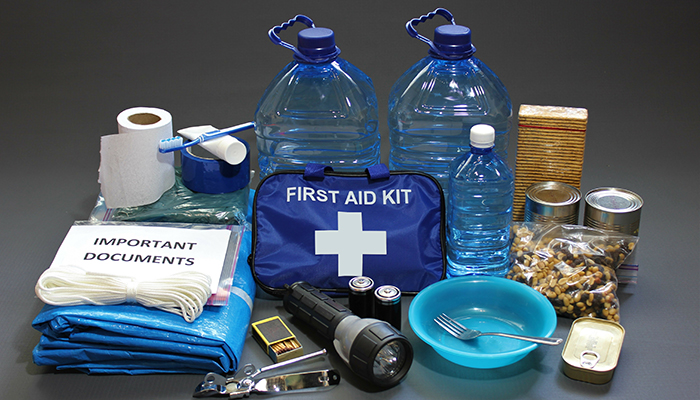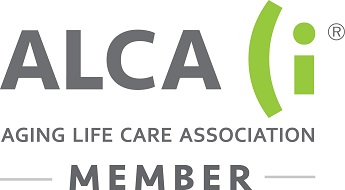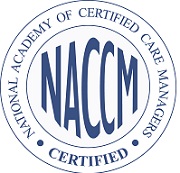Helpful tips for family caregivers
September/October 2010
September is a great month to get a fresh perspective and make plans for extra caregiving help and support.
- Are you prepared for a disaster?
- Get "Extra Help" with Medicare Rx Costs
- How is caregiving different for men?
Are you prepared for a disaster?
No one likes to dwell on the possibility of disaster. But we all need to prepare for one, just in case. Help your relatives gear up for safety. Whether you live across town or across the nation, the action items are the same.
Prepare to stay in contact. In case of a disaster, how will you know your relatives are safe?
- Because local phone service may be sketchy, choose an out-of-town contact. Also identify the address and phone number of a potential gathering place. This might be a friend’s house or a church, school, or store within walking distance. Ask family members to leave a note if they are evacuating. Have it include date, time, and plan. OR consider registering for the Red Cross Safe and Well program where family members can post messages for each other.
- Program “in case of emergency” (ICE) information into contacts on cell phones. This helps emergency personnel know who to phone.
- Teach family members to text message. Text messaging is often possible even when phone service is disrupted.
Assemble emergency supplies.
- Have a “go bag” suitcase packed with clothing, a pair of comfortable shoes, personal hygiene items, and prescription medicine in case there is little time before an evacuation.
- Regularly replace medications so they don’t expire.
- In a waterproof container (e.g., a “zip-lock” plastic bag), keep copies of health insurance cards and an up-to-date list of prescriptions, doctors, and any special needs. Also, family identification documents (things you might otherwise keep in a file at home: Passport, marriage certificates, vaccination records …).
- Include a list of important phone numbers (neighbors and family) in case the phone runs out of power.
- Pack an extra phone charger.
- Include a supply of cash.
- Consider packing an extra set of prescription eyeglasses, readers, or contact lens (and solution). Batteries for hearing aids.
- Include a special pillow, blanket, or other comforting item if your loved one has dementia. This can help keep them calm in a stressful situation away from home.
- Prepare a “stay box” using a few easy-to-carry waterproof containers with at least a three-day supply of necessities in case services are down but evacuation is not necessary.
- One gallon of water per person per day. Ideally, buy water containers and keep them sealed until needed. If you must prepare your own, use water storage safety precautions.
- First aid kit, over-the-counter medicines (pain and fever relievers, antidiarrhea medicines, antacids, laxatives, antihistamines), extra masks in case of dust, smoke, or the eventual need to shelter indoors with large groups.
- A whistle to call for help.
- Flashlight and a battery-powered or hand-crank radio. Check or replace batteries once every six months. Use the time changes in fall and spring as a reminder.
- Matches, candles, battery- or solar-powered lamp.
- Food, can opener, mess kits, or plates and spoons. Paper towels. Rotate in new canned goods if their expiration date is near.
- Bedding or sleeping bags.
- Moist towelettes, toilet paper, garbage bags, and plastic ties (for personal sanitation).
- Plastic sheeting and duct tape for makeshift shelter if needed. Or a pop-up tent. (This is handy for helping people with dementia stay calm if there is too much stimulation or chaos around them.)
- Wrenches to shut off gas and water.
- For those who are medically challenged
- Have your relative wear an identifying bracelet if they have a disability or significant medical condition.
- If your loved one has trouble getting around, keep an extra cane or walker in the car or with the stay box.
- If your loved one has assistive devices that require power (for example, an electric wheelchair), talk to the doctor or device provider about options when the power is out. Contact the local utility company to see if the person you care for can be put on a priority power restoration list.
- Store instructions for assistive devices in the go bag with other important documents. Note the serial number of each device in case the provider needs to be contacted.
- Create a list of the nearest medical facilities, hospitals, and transportation options. If your relative is on dialysis, locate alternate centers that are somewhat close but far enough away that they may not be affected by a local disaster.
- Consider enrolling in the Medicare Blue Button program so your relative can share their last three years of medical history with doctors they haven’t seen before. (This is useful in case of a need to evacuate.) There’s also a Veteran’s Blue Button program.
Get tech-ready
- Sign up for alerts from local government or stay up to date via their social media channels.
- Consider downloading the FEMA app (Federal Emergency Management Agency) to stay informed.
- Get preparedness tips by texting PREPARE to 43362.
- Find open shelters by texting SHELTER and the zip code to 43362.
- Keep a portable phone charger in the car, and ideally a back-up energy supply.
- Store copies of important documents (insurance policies, medical records, identification documents) in the cloud or on a password-protected “thumb drive.”
- Sign up for direct deposit and online banking so funds can be accessed remotely in case of an evacuation.
Create a local support network
- Give at least one trusted neighbor a key to the house or apartment.
- Find a neighbor willing to be a “buddy” and show them where to find the emergency supply “stay box” you created.
- Show them how to operate any special equipment, such as oxygen or a wheelchair. Put written instructions in the stay box.
- Contact the city or county emergency department and find out if you can register your loved one to receive any special disaster check-ins offered to solo, disabled, or medically challenged seniors. If you aren’t sure which agency to call, start with the fire department or police department.
Get "Extra Help" with Medicare Rx Costs
Are drug costs a worry for your elder family member? This year, new assistance is available for many Medicare Part D participants.
Your family member may qualify for “Extra Help.” This program helps pay for a Medicare prescription plan. It trims monthly premiums and the annual deductible. And it shrinks the co-pay costs for prescriptions. The average annual savings is $3,900.
If your family member didn’t qualify for the program last year, apply again. There are new criteria this year. They make the “extra help” available to more people. Eligibility is based on income and financial resources. Specifically,
- Income must be less than $16,245 per year for an individual or $21,855 for a couple.
- This year, income does NOT include any help received from others for expenses such as rent, utilities, and food.
- Financial resources include bank savings, stocks, and bonds. An individual can have no more than $12,510 in such savings. A couple can have no more than $25,010.
- This year, life insurance policies are not counted.
You can apply online or call Social Security at 800-772-1213. Ask for help with prescription drug plan costs. They will send you the application.
Even without Extra Help, your loved one may get a rebate. The rebate is for individuals who fall into the Medicare Part D coverage gap. This is also called the “donut hole.” This year, everyone reaching the coverage gap will receive a tax-free rebate of $250. No application is necessary. A rebate check will be sent automatically to those who qualify. Next year, a 50% drug discount is planned for people who fall in the donut hole. The discount will apply to brand name drugs covered by the individual’s Part D plan.
Return to top
How is caregiving different for men?
It’s a little known fact: men represent at least one third of family caregivers across the nation. In some respects, they are more likely than women to face challenges. But they are less likely to ask for or receive the kinds of support all caregivers need.
Researchers report a number of issues that complicate the lives of male caregivers:
- Household tasks. Most men face a learning curve when they take over household tasks (things such as doing the laundry or cooking three meals a day). They have to learn on the job.
- Personal care. When it comes to bathroom activities, the intimacy of personal care is especially challenging for sons. But even husbands can feel inadequate handling daily needs, such as fixing hair. When possible, men tend to hire others to do these tasks.
- Identity challenges. The mundane chores of caregiving can seem emasculating. And the inability to “fix” a loved one’s disease may feel disempowering. In addition, men in the workforce report feeling they must hide their caregiving role. A caregiving man is considered less serious about his career.
- Emotional demands. As a rule, men prefer to keep their world steady by avoiding talk about emotional issues. Meeting an ill loved one’s emotional needs can be taxing.
- Emotional losses. Men traditionally get their emotional support from someone close at hand. But that very person may now be the family member needing care. Men tend to feel less comfortable turning to alternative sources, such as support groups.
It is for these reasons that male caregivers are especially subject to isolation. If you know a male caregiver, consider reaching out. Offer to do a household task together. Working together may lead to more personal conversation. At the least, he, like any other caregiver, will appreciate not feeling so alone with the job.
Return to top





